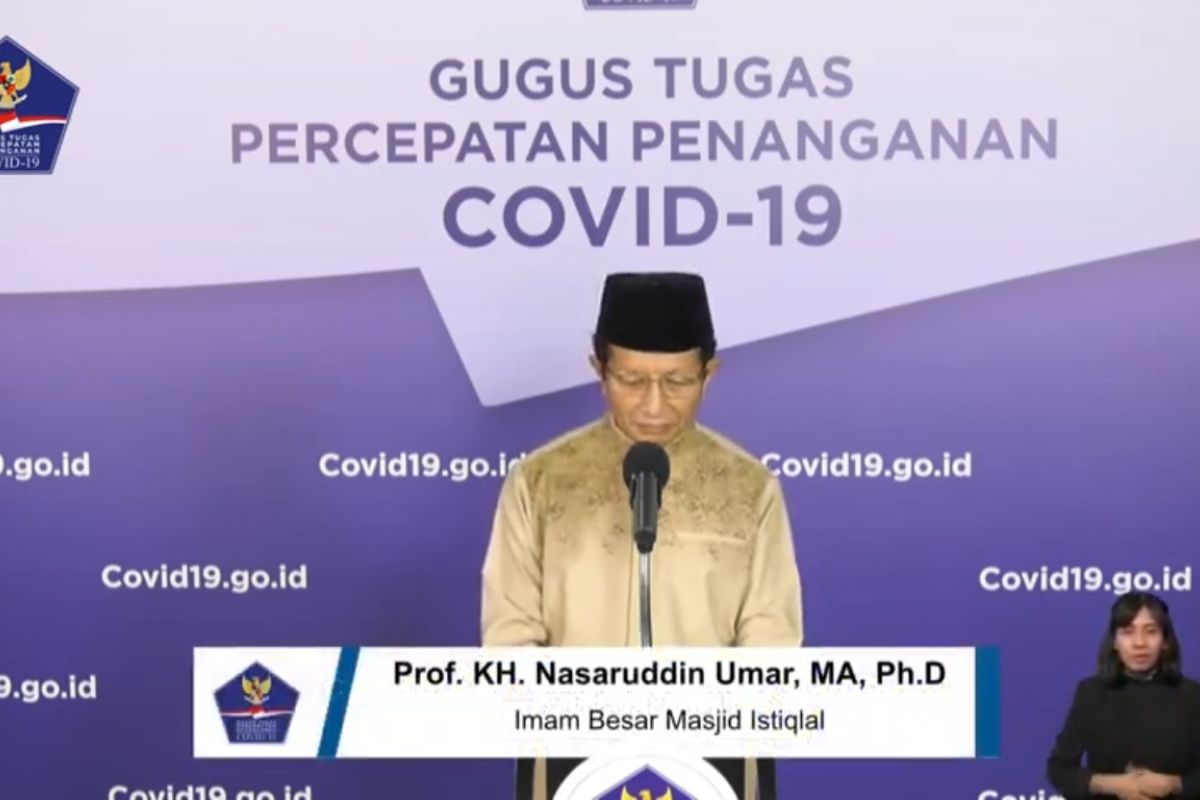Let us pray that next year's Ramadhan will not be like this year'sJakarta (ANTARA) - Istiqlal Mosque's grand imam, Professor KH Nasaruddin Umar, urged Indonesian Muslims nationwide to perform the Idul Fitri prayer at home rather than at mosques and fields to halt the spread of the new coronavirus disease.
At a regular press conference of the Indonesian Government's COVID-19 Task Force in Jakarta on Saturday, Umar stressed that the Idul Fitri prayer is not mandatory but instead a "sunnah," or voluntary act of worship.
"I deem it necessary to remind all that the Idul Fitri prayer is 'sunnah' while maintaining the health of families and ourselves is 'wajib,' or a mandatory act of worship," he noted.
Umar laid emphasis on prioritizing the mandatory acts. To this end, he appealed to members of the Muslim community to perform their Idul Fitri prayer at home rather than in crowds to stem the spread of the coronavirus outbreak among members of the congregation.
"We are not allowed to be selfish in practicing religious teachings. Perhaps, we are rewarded profusely at the mosque. However, while arriving home, we transmit the disease to our beloved relatives and also to our parents, who are vulnerable to contracting the infection," he pointed out.
If they were to contract the deadly virus, it would become increasingly difficult to forecast whether they will be able to meet for the holy fasting month of Ramadhan again next year. "Let us pray that next year's Ramadhan will not be like this year's," Umar stated.
Muslims are advised to strive to take decisions that will shape their destiny for the better. Thus, performing the Idul Fitri prayer at home is highly recommended. The "takbiran" event that features a recital of "Allahu Akbar" (God is great), may also be held at home, he remarked.
Last year, the "takbiran" event was held in mass gatherings at mosques and on the streets on the eve of the Idul Fitri celebrations that mark the end of Ramadhan.
Since the past three months, Indonesia has been battling the spread of the new coronavirus disease (COVID-19). The Indonesian government officially announced the country's first two confirmed COVID-19 cases on March 2, 2020.
This deadly coronavirus surfaced in Wuhan in the end of December 2019, but China's lack of transparency and goodwill to tell the truth of human-to-human transmissions from the start has resulted in its spread worldwide.
To stem the spread of the coronavirus disease, it has enforced large-scale social restrictions and distancing measures in several cities, including Jakarta, Bogor, Bekasi, Surabaya, and Makassar.
In breaking the chain of the COVID-19 pandemic, the East Java provincial government also send homebound travelers arriving from abroad and other parts of Indonesia for a 14-day quarantine at observation centers across the province.
A total of 7,387 villages and neighborhoods in East Java have set up observation rooms where homebound travelers can be quarantined for 14 days, according to the East Java provincial government.
EDITED BY INE
Related news: Markets, shopping malls in East Java's Jember closed weeklong
Related news: BIN proactively assists govt in conducting tests in COVID-19 hotbed
Penerjemah: Indriani, Rahmad Nasution
Editor: Fardah Assegaf
Copyright © ANTARA 2020


